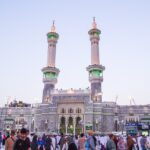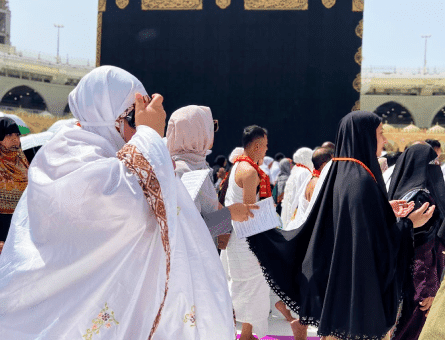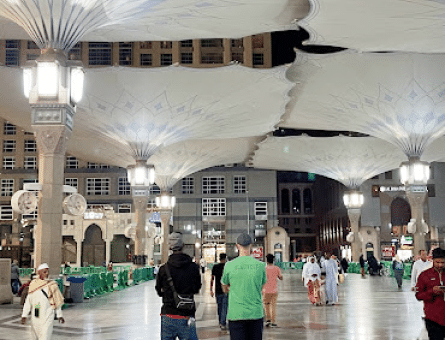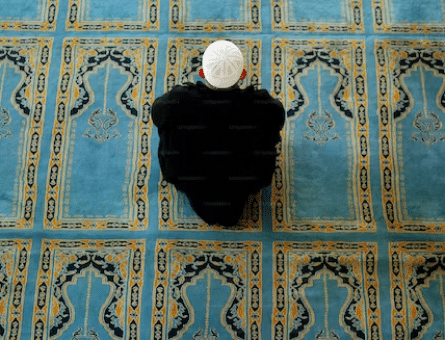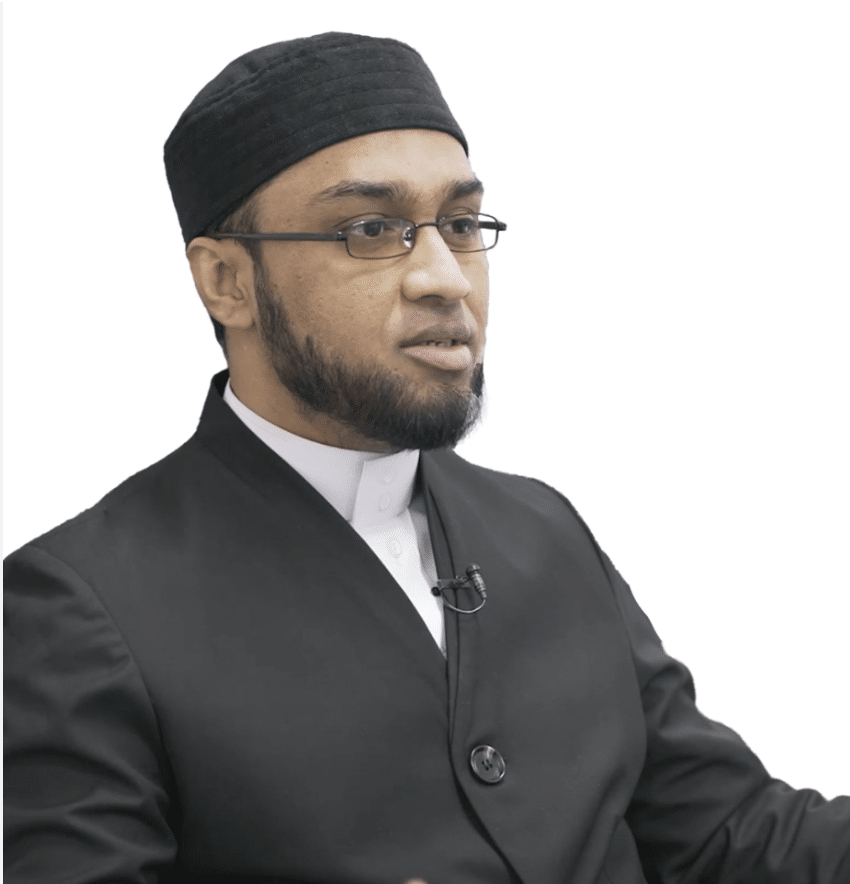The Farewell Sermon of Prophet Muhammad (PBUH)
Every year, more than 2.5 million Muslims from around the world visit the House of Allah SWT (Holy Kaaba) to perform Hajj. Around 1431 years ago, on the 9th of Dhul-Hijjah, while standing on the parched terrain of the Mount of Arafat, Prophet Muhammad (SAW) delivered Khutbatul Wada (farewell sermon).
While summarising exhortations based on the core teachings of Islam in the last sermon, the Messenger (PBUH) of Allah SWT addressed around 144,000 pilgrims and asked them to forward the Divine message. Here is everything you need to know about the farewell sermon of the Prophet Muhammad (SAW).
Prophet Muhammad’s (SAW) Last Sermon Explained
Unlike any other speech, the farewell sermon of the Prophet Muhammad (SAW) is the ultimate source of guidance on how to live in a God-fearing way. Capturing the ethos of Islam, Khutbatul Wada (farewell sermon) provides Muslims with a great lens for viewing the religion of peace. While focusing on the fundamental touchstones of faith, Prophet Muhammad (SAW), in the final sermon, gives a universal message of equality, peace, justice, non-violence, forgiveness, the rights of women, the sanctity of property and life, and the teachings of the pillars of Islam.
When Did the Prophet Muhammad (SAW) Deliver His Last Sermon?
Prophet Muhammad (PBUH) delivered the last sermon on the 9th of Dhul Hijjah, 10 AH (06 March 623 AD).
Where Did the Prophet Muhammad (SAW) Deliver His Last Sermon?
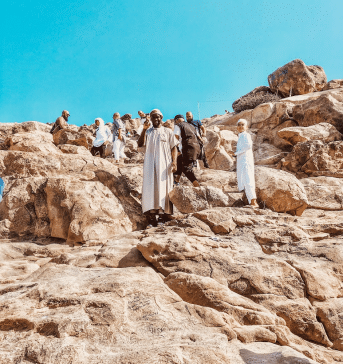 Prophet Muhammad (SAW) delivered the farewell sermon in the Uranah Valley of Mount Arafat, 20 kilometres east of Makkah, Saudi Arabia.
Prophet Muhammad (SAW) delivered the farewell sermon in the Uranah Valley of Mount Arafat, 20 kilometres east of Makkah, Saudi Arabia.
Speech of Prophet Muhammad (SAW) in English
Prophet Muhammad (SAW) delivered the farewell sermon in the Uranah Valley of Mount Arafat in Makkah, Saudi Arabia, on the ninth of Dhul-Hijjah. The words of the Messenger (SAW) of Allah SWT were relatively concise and clear. Addressing all of humanity, Prophet Muhammad (SAW), after praising and thanking Allah SWT said:
“O People, lend me an attentive ear, for I know not whether after this year, I shall ever be amongst you again. Therefore listen to what I am saying to you very carefully and take these words to those who could not be present here today.
O People, just as you regard this month, this day, this city as sacred, so regard the life and property of every Muslim as a sacred trust. Return the goods entrusted to you to their rightful owners. Hurt no one so that no one may hurt you. Remember that you will indeed meet your Lord and that He will indeed reckon your deeds. Allah has forbidden you to take usury (interest); therefore, all interest obligations shall henceforth be waived. Your capital, however, is yours to keep. You will neither inflict nor suffer any inequity. Allah has judged that there shall be no interest and that all the interest due to Abbas ibn Abdul Muttalib (Prophet Muhammad’s (SAW) uncle) shall henceforth be waived…
Beware of Satan for the safety of your religion. He has lost all hope that he will ever be able to lead you astray in big things, so beware of following him in small things.
O People, it is true that you have certain rights with regard to your women, but they also have rights over you. Remember that you have taken them as your wives only under Allah’s trust and with His permission. If they abide by your right, then to them belongs the right to be fed and clothed in kindness. Do treat your women well and be kind to them, for they are your partners and committed helpers. And it is your right that they do not make friends with anyone of whom you do not approve, as well as never to be unchaste.
“O People, listen to me in earnest, worship Allah, perform your five daily prayers (salah), fast during the month of Ramadan, and give your wealth in zakat. Perform Hajj if you can afford it.
All mankind is from Adam and Eve; an Arab has no superiority over a non-Arab, nor a non-Arab has any superiority over an Arab; also, a white has no superiority over a black, nor does a black have any superiority over a white, except by piety and good action.
Learn that every Muslim is a brother to every Muslim and that the Muslims constitute one brotherhood. Nothing shall be legitimate to a Muslim which belongs to a fellow Muslim unless it was given freely and willingly. Do not, therefore, do injustice to yourselves.
Remember, one day, you will appear before Allah and answer for your deeds. So beware, do not stray from the path of righteousness after I am gone.
O People, no prophet or apostle will come after me, and no new faith will be born. Reason well, therefore, O People, and understand words which I convey to you. I leave behind me two things, the Quran and my example, the Sunnah, and if you follow these, you will never go astray.
All those who listen to me shall pass on my words to others and those to others again, and may the last ones understand my words better than those who listen to me directly. Be my witness, O Allah, that I have conveyed your message to your people”.
(Reference: See Al-Bukhari, Hadith 1623, 1626, 6361) Sahih of Imam Muslim also refers to this sermon in Hadith number 98. Imam al-Tirmidhi has mentioned this sermon in Hadith nos. 1628, 2046, 2085. Imam Ahmed bin Hanbal has given us the longest and perhaps the most complete version of this sermon in his Masnud, Hadith no. 19774.)
After successfully delivering the last sermon, Prophet Muhammad (SAW) recited the following verse which had been just revealed onto him:
“This day the disbeliever’s despair of prevailing against your religion, so fear them not, but fear Me (Allah)! This day have I perfected for you, your religion and fulfilled My favour unto you, and it hath been My good pleasure to choose Islam for you as your religion.” (Holy Quran, 5:3)
Human Rights and the Last Sermon: Correlation
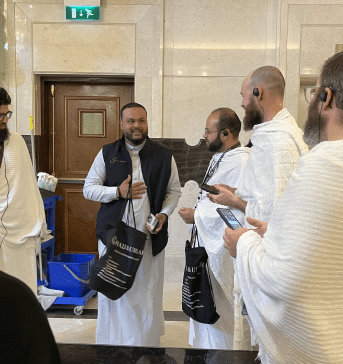 In his last sermon, Allah SWT’s Messenger (PBUH) talks about the obligations and rights of people as prescribed in Islam. In other words, Khutbatul Wada is one of history’s first and most comprehensive charters of human rights. In his farewell sermon, Prophet Muhammad (SAW) highlights the following human rights:
In his last sermon, Allah SWT’s Messenger (PBUH) talks about the obligations and rights of people as prescribed in Islam. In other words, Khutbatul Wada is one of history’s first and most comprehensive charters of human rights. In his farewell sermon, Prophet Muhammad (SAW) highlights the following human rights:
- Right to self-dignity, security, and life
- Right to reclaim trust by the owner
- Right to own a property
- Right to safety
- Right to personal freedom and financial independence
- Freedom from discrimination
- Right to access to information
- Rights of men and women, husband and wife
- Rights to maintain the religious institutions and practice the religion freely
- Equal social and economic rights
- Right to justice
- Rights of inheritance of both male and female children
- Right to protection from the law
What Is the Importance of the Last Sermon?
The last sermon was the first-ever human charter and was delivered by Prophet Muhammad (SAW) to humankind. While standing on Jabal al-Rahmat, it was a message so serene and sincere yet so thought-provoking and melodious.
It educates all of humanity with regards to the fundamental laws of life, the guiding principles concerning the rights of humankind and shows us the light, the hope that everyone deserves equal rights and equal chance to reform and become a better human being.
Regarded as a Universal Manifesto, it is the farewell sermon of the Prophet Muhammad (SAW) that shows us the true light of Islam, teaches us how to have faith, live, and pray, and that even then, if we have any questions, he (the Messenger (PBUH) of Allah SWT) is leaving behind his Sunnah and the Holy Quran as eternal sources of guidance.
Hadiths on the Prophet’s (SAW) Last Sermon
Highlighting the significance of the farewell sermon, Prophet Muhammad (PBUH) said, “O People! Verily your lives and your wealth are sacred and forbidden upon you until you meet your Lord, as sacred as this day and this month are.”
Jabr ibn Abdullah (RA) narrated that while addressing the Muslim Ummah in the middle of the day and at the end of the (Hajj) pilgrimage, Prophet Muhammad (SAW) said, “O people, your Lord is one, and your father Adam (RA) is one. There is no virtue of an Arab over a foreigner, nor a foreigner over an Arab, and neither white over Black nor Black over white, except by righteousness. Have I not delivered the message?” They said, “Of course, O Messenger (PBUH) of Allah SWT.” The Prophet Muhammad (SAW) said, “Let the witness inform those who are absent.” (Source: Shu’ab al-Imān 4706)
Sulaiman bin Amr bin Ahwaz (RA) reported, “My father told me that he was present on the Farewell pilgrimage with the Messenger of Allah. He praised and glorified Allah and reminder and exhorted (the people). Then he said: ‘I enjoin good treatment of women, for they are prisoners with you, and you have no right to treat them otherwise unless they commit clear indecency. If they do that, then forsake them in their beds and hit them, but without causing injury or leaving a mark.
If they obey you, then do not seek means of annoyance against them. You have rights over your women, and your women have rights over you. Your rights over your women are that they are not to allow anyone whom you dislike to tread on your bedding (furniture) not allow anyone whom you dislike to enter your houses. And their right over you is that should treat them kindly with regard to their clothing and food.” (Sunan ibn Maja Vol 3, Book 9, Hadith 1851)
5 Lessons from the Farewell Sermon
Also known as Khutbatul Wada, the farewell sermon was delivered by Prophet Muhammad (PBUH) at the beginning of the day of Arafah till Tasyriq, the middle of the day. Being the ultimate message of guidance for all mankind, the farewell sermon of the Prophet Muhammad (SAW) taught us many lessons. Five lifetime lessons that were taught in the last sermon are mentioned below:
Respect and Honour the Rights of Women
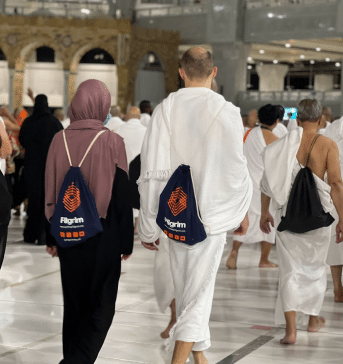 In the last sermon, Prophet Muhammad (SAW) speaks about women’s rights. Being the creation of Allah SWT and men’s partners in life, women deserve equal rights as men and shouldn’t be treated as their property.
In the last sermon, Prophet Muhammad (SAW) speaks about women’s rights. Being the creation of Allah SWT and men’s partners in life, women deserve equal rights as men and shouldn’t be treated as their property.
While stating that women deserve equal respect, love, and trust, the Messenger (PBUH) of Allah SWT said, “O People, it is true that you have certain rights concerning your women, but they also have rights over you.” The Prophet Muhammad (SAW) later mentioned, “Remember that you have taken them as your wives, only under Allah’s SWT trust and with his permission.” He later added, “I enjoin you to treat women well and be kind to them.” (Bukhari)
Uphold Human Dignity
Dhul-Hijjah is one of the most significant and sacred months in the Islamic calendar. It is the month when Muslims from all over the world gather in the Holy Kaaba to perform Tawaf and seek the blessings and forgiveness of Allah SWT.
While delivering the last sermon, Prophet Muhammad (SAW) highlighted the value of equality, respecting others, and doing everything in your power to help those in need.
Prophet Muhammad (PBUH) in a hadith said, “A Muslim is a brother of another Muslim, so he should not oppress him, nor should he hand him over to an oppressor. Whoever fulfilled the needs of his brother, Allah will fulfil his needs; whoever brought his (Muslim) brother out of a discomfort, Allah will bring him out of the discomforts of the Day of Resurrection. Whoever screens (humiliates) a Muslim, Allah will screen him on the Day of Resurrection.” (Sahih Al-Bukhari)
Prophet Muhammad (SAW) later added that in order to maintain peace in society, people should not trespass or harm one another: “Hurt no one, so that no one may hurt you.” (Bukhari)
In short, the farewell sermon of the Prophet Muhammad (SAW) teaches us not to discriminate against people on the basis of race, character, and colour and to have good intentions and show care and love for one another.
Hold on to the Teachings of Islam
Islam being the religion of peace teaches us everything there is to know about living a righteous, happy and peaceful life. While delivering the last khutbah (farewell sermon), Prophet Muhammad (PBUH), at various instances reminded us of the importance of the rights of humanity, that he is the last messenger of Allah SWT and that there would be no prophet after him, and that he is leaving us with the Holy Quran and his Sunnah as the sources of guidance to live a better life.
“O people, no Prophet or Messenger will come after me, and no new faith will be born. Therefore, understand the words which I convey to you. I will leave two things; the Quran and the Sunnah, and if you follow these, you will never go astray.” (Bukhari)
Therefore, it is the responsibility of Muslims to be mindful of their duties towards Allah SWT, including believing in His Oneness, fasting in the month of Ramadan, performing Hajj and Umrah, giving Zakat, and praying five times a day.
Avoid Economic Inequality
Socio-economic instability is when opportunity and wealth aren’t distributed equally within society. This results in making the poor poorer and the rich richer. Prophet Muhammad (PBUH), while emphasising the significance of socio-economic justice, said, “And give your wealth in Zakat.” (Bukhari)
Zakat, the third pillar of Islam, is an obligation on Muslims as it purifies one’s wealth and brings a sense of well-being, care, and serenity towards others.
Allah SWT in the Holy Quran says, “Take (O Muhammad (SAW)), from their wealth a charity by which you purify them and cause them to increase.” (Holy Quran, Surah Al-Taubah, 9:103)
Don’t Discriminate between One Another
In this temporary world, humans tend to be judged on the basis of their colour, race, religion, caste, and socio-economic status. This creates an imbalance in society. As humans, we tend to judge people based on their physical attributes and not what their heart or soul has to offer.
Stating every person as equal in the eyes of the All-Mighty, Prophet Muhammad (SAW), in the farewell sermon, said, “All humankind is from Adam (AS) and Hawa (AS). An Arab has no superiority over a non-Arab, nor does a non-Arab have superiority over an Arab; also, a white has no superiority over a black, nor a black has any superiority over a white – except by piety and good action.” (Bukhari)
Therefore, instead of focusing only on physical attributes, we must treat everyone as an equal and give them a chance to speak their hearts while we listen patiently – as every man is equal in the eyes of Allah SWT.
Summary – The Farewell Sermon of Prophet Muhammad (SAW)
Being an integral part of the annual pilgrimage (Hajj) even today, the farewell sermon of the Prophet Muhammad (SAW) is addressed to Muslims worldwide. Khutbatul Wada reminds Muslims about the teachings of Islam; praying five times a day, helping each other, giving zakat and sadaqah, fasting in Ramadan, and treating everyone with kindness.
The last sermon reminds us that Allah SWT is the Creator of the entire universe, Prophet Muhammad (SAW) is the last messenger and that the Holy Quran and Sunnah are gifted to us to teach us the righteous way of life and make us better human beings.
Explore The New Pilgrim App
The Ultimate App
for Hajj and Umrah!








